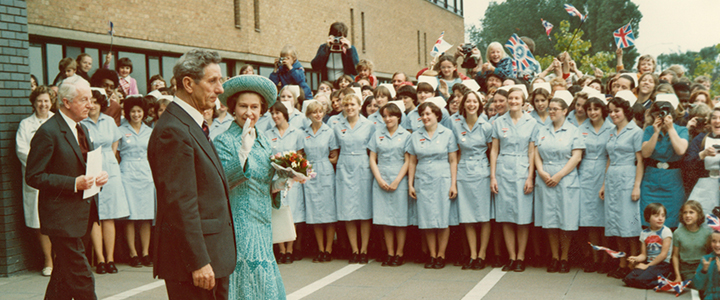
History of the School of Medicine
The University of Nottingham has been teaching medicine in Nottingham for 50 years.
Opening of the Medical School
On 27 July 1964 the Minister of Health announced in parliament that a new medical school and university hospital was to be established at the University of Nottingham. This was to be the first new medical school established in the UK in the twentieth century. Nottingham was chosen for both local and national reasons.
The first students arrived at the University of Nottingham Medical School in October 1970. Teaching took place in temporary accommodation on the University Park campus and in existing Nottingham hospitals whilst work on the new school and hospital progressed. There were 48 students in the first intake. Teaching began with a staff of six professors and numerous lecturers in the foundation departments of Human Morphology, Biochemistry, Pathology, Physiology, Medicine and Community Medicine. The Dean of the Medical School, Professor Greenfield, was also the Chair of the Department of Physiology.
Find out more about the Medical School's history
View the Medical School Collection
Major Achievements
MRI
Dr Peter Mansfield (later Sir Peter Mansfield) of the Department of Physics began investigating nuclear magnetic resonance as an alternative to X-rays for the determination of crystal structures in the early 1970s. The method led to the development of magnetic resonance imaging (MRI) and revolutionised diagnostic medicine. Sir Peter Mansfield was awarded a Nobel Prize for Medicine for his work in 2003.
View Sir Peter Mansfield discussing the development of MRI
Breast Cancer
Research by Professors Roger Blamey, Ian Ellis and their colleagues led to the introduction of the Nottingham Prognostic Index in 1982, a risk prediction model for the survival of women with primary breast cancer. It is still used today in many countries for selecting patients who should be offered further therapies.
Professor John Robertson led in the development of a new anti-oestrogen drug treatment - fulvestrant (Faslodex ®) - the only new endocrine therapy register in the last ten years as part of a twenty year partnership with AstraZeneca.
Biomaterials
Research led by Professor Roger Bayston led to patented technology for hydrocephalus shunts that give biomaterials long-acting antimicrobial action and reduced the common complication of infection. Almost 70% of shunts used annually now include our Bactiseal® shunt since 2008.
Cochlear Implants
In 1989, the Nottingham Cochlear Implant Programme was established and provided the first child with a cochlear implant in the UK based on a surgical technique pioneered by Professors Gerry M. O'Donoghue and Kevin Gibbin.
Lungs
The EarlyCDT-Lung test, the world’s first autoantibody blood test for the detection of early-stage lung cancer was launched in 2009 and is now used clinically across the world. The life saving test was the result of research directed by Professor John Robertson.
2010 saw Professor Ian Hall's programme of research with Professor Martin Tobin of Leicester University identify six genes which help predict lung function in human populations.